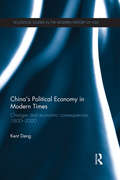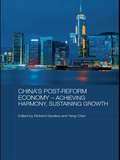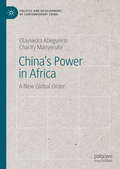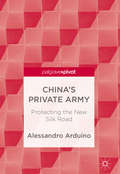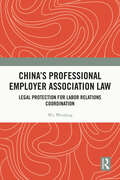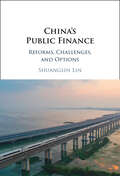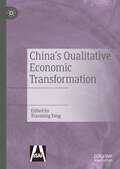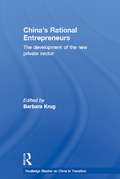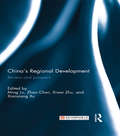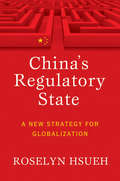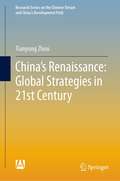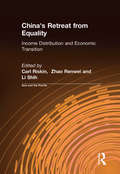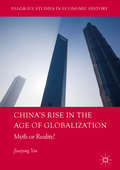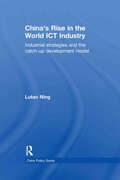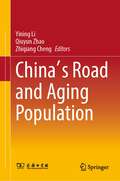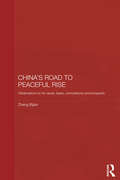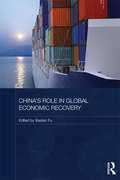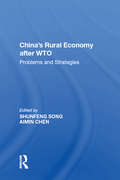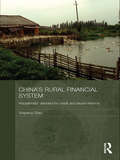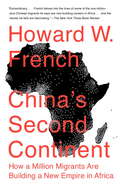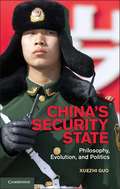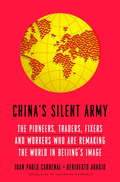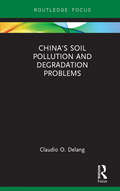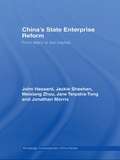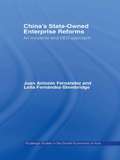- Table View
- List View
China's Political Economy in Modern Times: Changes and Economic Consequences, 1800-2000 (Routledge Studies in the Modern History of Asia)
by Kent G DengThis book makes an important contribution to the study of changes in China’s institutions and their impact on the national economy as well as ordinary people’s daily material life from 1800 to 2000. Kent Deng reveals China’s mega-cycle of prosperity-poverty-prosperity without the usual attribution to the 1840 Opium War, or the alleged population pressure, class struggle and oriental despotism. The book challenges the conventional view on ‘rebellions’, ‘revolutions’ and their alleged motivations and outcomes. Its findings separate commonly circulated myth with reality based on solid evidence and careful evaluation. The benchmark used by the author is people’s entitlement and mundane day-to-day material well being, instead of the stereotype of aggregates of industrial hardware and national GDP. China’s Political economy in Modern Times proves that state-building was the prime mover in China’s modern history. Contrary to the popular belief in mass movement, Deng shows convincingly that changes were in most cases imposed by a minority with external help. Therefore, the quality of the state was unpredictable, seen from the anti-state that cost lives and economic growth. This book will be of interest to students and scholars of Chinese Politics, Chinese Economics, Chinese History, and Political Economy.
China's Post-Reform Economy - Achieving Harmony, Sustaining Growth (Routledge Studies On The Chinese Economy Ser.)
by Richard Sanders Yang ChenChina has enjoyed heroic growth rates in the last twenty five years of reform and transition, pulling more people out of poverty more quickly than at any other time in human history. Nonetheless these successes have had costs: today China is faced with increasing environmental difficulties and there is a dangerous level of inequality of income and
China's Power in Africa: A New Global Order (Politics and Development of Contemporary China)
by Olayiwola Abegunrin Charity ManyerukeThis book examines China’s political, economic, and diplomatic engagement in Africa. The rapid increase of China’s economic and political involvement in Africa is the most momentous development on the continent of Africa since the beginning of the twenty-first century. China is now Africa’s largest trading partner and the largest infrastructure financier. Additionally, it is the fastest growing economy and source of foreign direct investment. This monograph seeks to understand the dynamics of the escalating Chinese investments in African economies and the political implications of this development for Africa. This work will interest scholars, students, academics, and policy makers on the fields of Chinese and African politics, development studies, and international political economy.
China's Private Army: Protecting the New Silk Road
by Alessandro ArduinoThis book illustrates the role that Private Security Companies (PSC) with 'Chinese characteristics' play in protecting people and property associated with the Belt and Road Initiative (BRI). The revival of the ancient Silk Road economic "belt," combined with the 21st Century sea lanes of communication known as the "road," is intended to enhance global connectivity and increase commercial activity. However, the socio-political risks associated with Chinese outbound direct investments are often overlooked. Terrorism, separatism, kidnapping and other risks are mostly new to Chinese companies, some of which are operating abroad for the first time. Economic globalization and the transnational exploitation of natural resources have increased the need for Chinese-owned PSCs in spite of the disdain for the profession of "a lance for hire. " Due to peculiar geo-strategic and geo-economic features, the "belt" from Central Asia to Pakistan and the "road" from the Somali coast to the Strait of Malacca are characterized by a high level of insecurity. This book's focus on how the state's monopoly of force privatization can play a significant role in protecting the New Silk Road will be of interest to policymakers, journalists, and academics.
China's Professional Employer Association Law: Legal Protection for Labor Relations Coordination
by Wu WenfangThis book studies the coordination mechanism of labor relations from the perspective of China’s law on employer association.The first part of the book examines the definition, functions, and institutional basis of employer associations in different types of labor relations, focusing on the complementarity between the law and the coordination mechanism of labor relations in the context of different social environments, institutional frameworks, and their different responses to deregulated labor policies. It then reviews the legislation, responsibilities, and institutional guarantees of employer associations in modern China. The second part outlines the current limitations of legal resources in terms of subject matter, participation mechanisms, and participation channels that constrain the coordination of industrial relations by China’s employer associations. The author emphasizes that the systematic legal safeguards of employer associations should be function-oriented and gradually established in a targeted and differentiated manner.The title will appeal to labor and employment law scholars and legislators, and especially to those interested in the law of employer association.
China's Public Finance: Reforms, Challenges, and Options
by Shuanglin LinA comprehensive, up-to-date, insightful, and innovative masterpiece on the Chinese public finance has finally emerged to fill the gap in the field. Considering China's public finance in its entirety, from tax systems, government spending, infrastructure financing, fiscal policies, local government debt, and central-local fiscal relationships to urban and rural social security and healthcare, it analyses China's public finance reforms and examines the reasons and the consequences of these reforms. It explores the challenges to China's public finance, examines its problems, and suggests potential solutions. While covering a broad range of themes, this book remains judicious with the evidence, providing its readers with innovative yet careful conclusions. Using enormous amount of the latest data and illustrative diagrams, the author explains China's public finance with expertise and clarity. This is an indispensable resource for students and scholars from a range of disciplines with an interest in the Chinese economy.
China's Qualitative Economic Transformation
by Xianming YangThis book explores the challenges China has faced during its economic restructuring, including trade wars, rising costs of labor and land, climate change, recalcitrant state-owned enterprises, an aging population and other problems. Since its historic reform and opening up, China has achieved and sustained remarkable economic growth driven primarily by manufacturing and the real estate industry. As the country continues to move up the supply chain, "Made in China," once synonymous with poor quality, but has come to mean advanced technologies. China’s future economic growth and its success in economic restructure will depend crucially on the dynamic evolution of the country’s comparative advantages. Contributors examine how the dynamic evolution of China’s comparative advantages can help the country overcome two closely related problems: heavy dependence on low value-added exports and the prospects of falling into the middle-income trap. The book will be of value to researchers interested in China’s economic development and policies.
China's Rational Entrepreneurs: The Development of the New Private Sector (Routledge Studies on China in Transition #Vol. 20)
by Barbara KrugThe ability of China's entrepreneurs to establish firms in the midst of a strangling bureaucratic system is a topic which demands attention not least because it forms the basis of China's economic development. Combining theoretical approaches with extensive fieldwork, China's Rational Entrepreneurs presents a fresh angle of analysis for understanding the behaviour of Chinese entrepreneurs and what kind of relations they have with local government in order to secure long-term business success.
China's Regional Development: Review and Prospect
by Ming Lu Zhao Chen Xiwei Zhu Xianxiang XuChina is a large developing economy and it has been deeply involved in globalization since its economic reform and opening-up. Simultaneously, China has seen a significant change in the spatial distribution of economic resources, especially capital and labor. In the recent 10 years, economists have made significant progress in both theoretical and empirical studies on related topics. The book provides an overview on the existing literature and current policy debates on what we have known and what we have misunderstood. This book includes an analytical framework of the New Economic Geography (NEG) with political economy to help us understand China’s regional development issues. The book of 10 chapters is organized into four thematic sections. The first section is a theoretical discussion on the relationship between economic agglomeration and interregional balanced development. The second section is a political economy analysis on regional and urban-rural development. The third section provides a summary on empirical literatures concerning from market segmentation and institutional barriers to production factor mobility. The final section consists of four empirical chapters on the relationship between agglomeration and balance, which is the core of relevant policy debates. The book argues that for China to achieve both efficiency and balance for regional development, China may need to reform its systems which constrain production factors mobility. This book is a valuable reference for readers who are interested in spatial economics and the Chinese economy, especially its regional and urban development.
China's Regulatory State: A New Strategy for Globalization (Cornell Studies in Political Economy)
by Roselyn HsuehToday's China is governed by a new economic model that marks a radical break from the Mao and Deng eras; it departs fundamentally from both the East Asian developmental state and its own Communist past. It has not, however, adopted a liberal economic model. China has retained elements of statist control even though it has liberalized foreign direct investment more than any other developing country in recent years. This mode of global economic integration reveals much about China’s state capacity and development strategy, which is based on retaining government control over critical sectors while meeting commitments made to the World Trade Organization. In China's Regulatory State, Roselyn Hsueh demonstrates that China only appears to be a more liberal state; even as it introduces competition and devolves economic decisionmaking, the state has selectively imposed new regulations at the sectoral level, asserting and even tightening control over industry and market development, to achieve state goals. By investigating in depth how China implemented its economic policies between 1978 and 2010, Hsueh gives the most complete picture yet of China's regulatory state, particularly as it has shaped the telecommunications and textiles industries. Hsueh contends that a logic of strategic value explains how the state, with its different levels of authority and maze of bureaucracies, interacts with new economic stakeholders to enhance its control in certain economic sectors while relinquishing control in others. Sectoral characteristics determine policy specifics although the organization of institutions and boom-bust cycles influence how the state reformulates old rules and creates new ones to maximize benefits and minimize costs after an initial phase of liberalization. This pathbreaking analysis of state goals, government-business relations, and methods of governance across industries in China also considers Japan’s, South Korea’s, and Taiwan’s manifestly different approaches to globalization.
China's Renaissance: Global Strategies in 21st Century (Research Series on the Chinese Dream and China’s Development Path)
by Tianyong ZhouThis book studies China’s international relations, development strategies and development path. It provides an objective and in-depth analysis of areas including international relations in the context of China’s population and resource environment, ways to strengthen China’s external competitiveness, strategies for economic security and China’s trade currency, Sino-US relations in the 21st Century, geopolitical strategy and great renaissance of Chinese culture. The book analyzes the difficulties, challenges and unique features of China’s economic and social development. Further, it examines long-term and short-term social and economic issues as well as the difficulties in dealing with the issues. It provides objective and realistic suggestions for realizing China’s dream of the great rejuvenation of the nation. It is a valuable source of reference for researchers and practitioners interested in China’s development.
China's Retreat from Equality: Income Distribution and Economic Transition
by Carl Riskin Zhao Renwei Li ShihA collection of 13 essays based on two national surveys of household income in China - in 1985 and 1995 - and prepared and carried out by the research team. These essays explore a wide range of aspects of the rapidly changing income distribution during this period.
China's Rise in the Age of Globalization: Myth or Reality? (Palgrave Studies in Economic History)
by Jianyong YueThis book deconstructs a series of myths surrounding China's economic rise. The first myth is that globalization led directly to China's rise; the second is that China is another East Asian developmental state; the third that China's market reform had been implemented in an incremental way; and fourth that China's 'resilient authoritarianism' has been effective in ensuring the country's economic and political transformation. Yue argues that the China model is one of 'crony comprador capitalism' that has hindered the country's attempts at economic and political modernity. It is argued that the United States' strategy of integrating China into the international system is self-defeating in the long run; not because such an approach has created a 'restless empire' capable of challenging US primacy, but because the Chinese 'miracle' has subsequently backfired on the liberal order created after World War Two. Covering the entire reform period from the end of the Cultural Revolution in 1976 to the present day, the author calls for readers to rethink globalization and leave more policy space for China and the developing nations to pursue national development through internal integration, which is more conducive to democratic transition and global peace.
China's Rise in the World ICT Industry: Industrial Strategies and the Catch-Up Development Model (China Policy Series)
by Lutao NingOne of the most striking phenomena of China’s remarkable economic growth is that its huge volume of exports are becoming high-tech. China is now the world's largest Information and Communication Technology (ICT) exporter, having overtaken Japan and the European Union in 2003 and the United States in 2004. China's ICT industry is also the largest manufacturing sector within the Chinese economy. This book examines how China has attained this leading position and presents one of the first accounts of China’s ICT development model with specific reference to the experiences of East Asian 'tigers'. It shows how the development of the industry was military-driven before 1978, and how subsequently Chinese policymakers, struggling with domestic market reform and challenged by trade liberalisation and globalisation, managed to push through ICT development strategies. Overall, it discusses the debates between policymakers as to the most appropriate economic development strategy for 'catching-up' and demonstrates how China moved away from the across-the-board protectionist and interventionist industrial policies pursued by many developing countries, but has not wholeheartedly followed the neo-liberal free trade and market polices favoured by the World Bank, WTO and IMF. By doing so, it sheds light on the limitations of China’s strategies moving forward, and identifies policy lessons for other developing countries.
China's Road and Aging Population
by Yining Li Zhiqiang Cheng Qiuyun ZhaoIn the context of global population aging , the aging population of China is not only a China-specific problem but also a global concern. Based on in-depth analysis, this book focuses on the increasingly serious issue of aging population of China at the present time, and explores the possible path and solution from the new type of demographic dividend that is innovation. With 1/5 of the global aging population in the world, China has the largest aging population and is aging faster and deeper, which produces and , profound and far-reaching impact on the economic growth, social security, health care and other related areas.
China's Road to Peaceful Rise: Observations on its Cause, Basis, Connotation and Prospect (Routledge Studies on the Chinese Economy)
by Zheng BijianZheng Bijian has been one of the most influential thinkers and policy formulators in China during its reform period. In the early 1990s he worked with Deng Xiaoping collating and publishing Deng’s speeches and as vice president of the Party School gave top priority to ensuring that members of the Party were thoroughly familiar with Deng’s views, theories and reform agenda. In this important book, which is already available in Chinese, Zheng Bijian sets out his views and relates how his views were formed and developed over the long reform period, including the full text of his important speeches and papers, together with appropriate introductory material. Particular key themes which Zheng Bijian’s thought has contributed to China’s development are that China should embrace globalization and strengthen its relationship with the rest of the world, and that China’s development should be peaceful. "Zheng Bijian’s ideas, actions and vision helped China in its astonishing thirty years growth. Zheng Bijian made a great contribution to envisioning the new role of China in a globalized world. This book is the intellectual story of a great witness of our times." - Romano Prodi, former President of the European Commission and former Prime Minister of Italy
China's Role in Global Economic Recovery (Routledge Studies on the Chinese Economy)
by Xiaolan FuThis book presents a wide-ranging assessment of the current state of China’s economy in relation to the global international economy. It discusses the role China has played in responding to the economic crisis; assesses the continuing strong prospects for further economic growth in China; and examines China’s deepening integration into the world economy. Specific topics covered include China’s foreign reserves and global economic recovery; the international expansion of Chinese multinationals and China’s private businesses; and the role of technological innovation in China’s economic growth. Overall, the book provides a wealth of detail and up-to-date insights concerning China’s development path, growth potential, sustainability and impact.
China's Rural Economy after WTO: Problems and Strategies (The\chinese Economy Ser.)
by Aimin ChenChina's Rural Economy after WTO discusses and analyses China's rural sector problems in detail, including the areas of poverty, income inequality, the gender gap, barriers of rural-urban migration, discrimination against rural workers, poor rural governance and the impact of WTO membership. It also tackles the important subjects of inadequate infrastructure and discriminatory credit services. Strategies to modernize China's rural economy are proposed and the relevant experiences and lessons of other countries are analyzed.
China's Rural Financial System: Households' Demand for Credit and Recent Reforms (Routledge Studies on the Chinese Economy)
by Yuepeng ZhaoThis book examines the credit needs and the borrowing behaviour of rural households in China in recent years. It is based on in-depth analysis of the status of households’ indebtedness and borrowing behaviour; the performance of Rural Credit Cooperatives (RCCs), as well as resources of informal finance. Before 2006, RCCs are virtually the only source of formal credit for rural households in China and were subject to a series of reforms from 1996 to 2003. The reforms aimed to transform RCCs into market-oriented institutions and, more importantly, help them meet the increasing demands of farmers for varied financial services, and thereby contribute effectively to economic transformation in rural China. Based on a micro-study of three villages, at different stages of development with dissimilar economic characteristics in Jiangxi province, this book investigates the sources of finance, formal and informal, in rural areas and the different types of credit that farmers require. It examines the patterns of credit required by rural households at different stages of agricultural processes, and the institutions from which they obtain loans. It demonstrates the importance of innovative institutional arrangements in rural China and new instruments that give farmers access to formal rural financial markets and enable them to utilize credit effectively, concluding that further reforms to RCCs are necessary for RCCs to be truly effective.
China's Second Continent: How a Million Migrants Are Building a New Empire in Africa
by Howard W. FrenchAn exciting, hugely revealing account of China's burgeoning presence in Africa--a developing empire already shaping, and reshaping, the future of millions of people. <P> A prizewinning foreign correspondent and former New York Times bureau chief in Shanghai and in West and Central Africa, Howard French is uniquely positioned to tell the story of China in Africa. Through meticulous on-the-ground reporting--conducted in Mandarin, French, and Portuguese, among other languages--French crafts a layered investigation of astonishing depth and breadth as he engages not only with policy-shaping moguls and diplomats, but also with the ordinary men and women navigating the street-level realities of cooperation, prejudice, corruption, and opportunity forged by this seismic geopolitical development. With incisiveness and empathy, French reveals the human face of China's economic, political, and human presence across the African continent--and in doing so reveals what is at stake for everyone involved. <P> We meet a broad spectrum of China's dogged emigrant population, from those singlehandedly reshaping African infrastructure, commerce, and even environment (a self-made tycoon who harnessed Zambia's now-booming copper trade; a timber entrepreneur determined to harvest the entirety of Liberia's old-growth redwoods), to those just barely scraping by (a sibling pair running small businesses despite total illiteracy; a karaoke bar owner-cum-brothel madam), still convinced that Africa affords them better opportunities than their homeland. And we encounter an equally panoramic array of African responses: a citizens' backlash in Senegal against a "Trojan horse" Chinese construction project (a tower complex to be built over a beloved soccer field, which locals thought would lead to overbearing Chinese pressure on their economy); a Zambian political candidate who, having protested China's intrusiveness during the previous election and lost, now turns accommodating; the ascendant middle class of an industrial boomtown; African mine workers bitterly condemning their foreign employers, citing inadequate safety precautions and wages a fraction of their immigrant counterparts'. <P> French's nuanced portraits reveal the paradigms forming around this new world order, from the all-too-familiar echoes of colonial ambition--exploitation of resources and labor; cut-rate infrastructure projects; dubious treaties--to new frontiers of cultural and economic exchange, where dichotomies of suspicion and trust, assimilation and isolation, idealism and disillusionment are in dynamic flux. <P> Part intrepid travelogue, part cultural census, part industrial and political exposé, French's keenly observed account ultimately offers a fresh perspective on the most pressing unknowns of modern Sino-African relations: why China is making the incursions it is, just how extensive its cultural and economic inroads are, what Africa's role in the equation is, and just what the ramifications for both parties--and the watching world--will be in the foreseeable future.
China's Security State: Philosophy, Evolution, and Politics
by Xuezhi GuoChina's Security State describes the creation, evolution, and development of Chinese security and intelligence agencies as well as their role in influencing Chinese Communist Party politics throughout the party's history. Xuezhi Guo investigates patterns of leadership politics from the vantage point of security and intelligence organization and operation by providing new evidence and offering alternative interpretations of major events throughout Chinese Communist Party history. This analysis promotes a better understanding of the CCP's mechanisms for control over both Party members and the general population. This study specifies some of the broader implications for theory and research that can help clarify the nature of Chinese politics and potential future developments in the country's security and intelligence services.
China's Silent Army
by Juan Pablo Cardenal Catherine Mansfield Heriberto AraujoThe first book to examine the unprecedented growth of China's economic investment in the developing world, its impact at the local level, and a rare hands-on picture of the role of ordinary Chinese in the juggernaut that is China, Inc. Beijing-based journalists Juan Pablo Cardenal and Heriberto Araújo crisscrossed the globe from 2009-2011 to investigate how the Chinese are literally making the developing world in their own image. What they discovered is a human story, an economic story, and a political story, one that is changing the course of history and that has never been explored, or reported, in depth and on the ground. The "silent army" to which the authors refer is made up of the many ordinary Chinese citizens working around the world - in the oil industry in Kazakhstan, mining minerals in the Democratic Republic of Congo, building dams in Ecuador, selling hijabs in Cairo - who are contributing to China's global dominance while also leaving their mark in less salutary ways. With original and fresh reporting as well as top-notch writing, China's Silent Army takes full advantage of the Spanish-speaking authors' outsider experience to reveal China's influence abroad in all its most vital implications - for foreign policy, trade, private business, and the environment.
China's Soil Pollution and Degradation Problems
by Claudio O. DelangChina’s air pollution is infamous. The haze can make it impossible to see buildings across the street, and the pollution forces schools to close and creates health and morbidity problems, in addition to tremendous environmental degradation. However, China also faces another important environmental problem, which is less well-known to the public: that of soil degradation and pollution. This book provides an overview of the problems related to soil degradation and pollution throughout China, examining how and why current policy has fallen short of expectation. It also examines the challenges faced by policy makers as they attempt to adopt sustainable practices alongside a booming and ever-expanding economy. China's Soil Pollution and Degradation Problems utilizes grey literature such as newspaper articles, NGO reports and Chinese government information alongside academic studies in order to provide an extensive review of the challenges faced by grassroots organizations as they tackle environmental policy failings throughout China. This book will be of great interest to students of environmental pollution and contemporary Chinese studies looking for an introduction to the topics of soil pollution and soil degradation, and for researchers looking for an extensive list of sources and analysis of China's environmental problems more broadly.
China's State Enterprise Reform: From Marx to the Market (Routledge Contemporary China Series)
by John Hassard Jonathan Morris Jackie Sheehan Meixiang Zhou Jane Terpstra-TongBased on extensive original research, this book provides a comprehensive overview of the current status of state enterprise reform in China. Chinese State Enterprise Reform considers the relationship between public ownership and public enterprises, and the historical evolution of China's economic reform programme since 1978, including assessments of the Contrast Responsiblity System, which operated from the early 1980s to the early 1990s, and the Group Company Experiments, which began in the 1990s. It discusses the relations between workers, managers, and the state in post-Dengist China, the implications of the reform programme for human resources management in state enterprises, the nature of labour representation, and organization under tate capitalism and the problems of surplus labour and reemployment.
China's State Owned Enterprise Reforms: An Industrial and CEO Approach (Routledge Studies in the Growth Economies of Asia)
by Juan Antonio Fernandez Leila Fernandez-StembridgeMuch has been written on China's State-Owned Enterprises ( SOEs) reform following the restructuring impact on China's economic reform process in the last decade. However, as a major root of social and economic change, little has been discussed beyond a description of SOEs shortcomings and their overall impact on the economy. This book provides a more in-depth analysis of SOEs by assessing the transformation process of eleven specific industries, with reference to the state of competition, the influence of WTO membership and the challenges these industries face in the future. Importantly, the authors also provide a personal perspective alongside the industry analysis with eleven case studies of firms actually undergoing this restructuring process, including interviews with crucial agents of reform such as CEOs and GMs. The provision of both a macro and business perspective of SOEs reforms provides the reader with a complete and accurate insight into the economic, social and business reality of China today. China's State Owned Enterprises' Reforms will therefore be essential reading for those interested in the Chinese economy and Chinese business, as well as economists, foreign investors, MBA and EMBA students and scholars specializing in emerging or transitional economies.
